 Some details of Sony’s eagerly-awaited debut into the dSLR market have begun to emerge online.
Some details of Sony’s eagerly-awaited debut into the dSLR market have begun to emerge online.
The Australian Digital Photography Blog website has revealed that Sony’s new Alpha 100 dDSLR will offer 10.2 million effective megapixels and be fitted with an APS-C size CCD sensor.
As previously announced, Sony’s first dSLR camera will use an updated lens mount compatible with Konica-Minolta Alpha/Maxxum/Dynax lenses, with Sony expected to reveal a slew of new Sony G lens using the highly regarded Carl Zeiss optics.
The camera is expected to carry a large 2.5 inch format Clear Photo LCD Plus Screen with AR coating and a resolution of 230,000 pixels.
The bright optical viewfinder comes with a Spherical Acute Matte screen, 20mm eye relief, 0.83x magnification, dioptre adjustment and an interesting EyeStart Auto focus.
 This feature – inherited from Minolta -begins autofocus and auto-exposure as soon as it detects your peeper gazing through the viewfinder. Neat
This feature – inherited from Minolta -begins autofocus and auto-exposure as soon as it detects your peeper gazing through the viewfinder. Neat
The camera is also rumoured to be incorporating Sony’s Super SteadyShot Picture Stabilisation technology, which employs horizontal and vertical motion sensors located inside the lens assembly area.
Although there’s no firm details of pricing yet, some pundits are estimating a street price of $1,000 (body only) which places it in the highly competitive enthusiast market.
Other leaked details include an Anti-dust protection system (We like these – a lot!), 1600 ISO equivalent, Burst shooting, advanced flash modes and BIONZ Image Processing Engine.
 The onboard high-speed autofocus is said to sport 4 focus modes – Single-shot AF; Direct Manual Focus; AF Automatic; AF Continuous – with centre-weighted, spot and 40-segment honeycomb pattern metering modes.
The onboard high-speed autofocus is said to sport 4 focus modes – Single-shot AF; Direct Manual Focus; AF Automatic; AF Continuous – with centre-weighted, spot and 40-segment honeycomb pattern metering modes.
The Sony Alpha 100 looks to weigh in at 545g without battery, with dimensions of 94.7 x 133.1 x 71.3 mm (L x W x D).
We should point out that Sony don’t actually call it the ‘Alpha’ in print, preferring to use the arty squiggly symbol (a bit like popstar Prince and long forgotten 80s nobby band Freur), but we couldn’t be arsed to try and find that on our keyboards.
Sony is expected to make an official announcement about the Alpha 100 later this month, but if these tempting specs are on the money, Sony could be set to make a big splash in a market currently dominated by Canon and Nikon.
 Google Earth/Maps
Google Earth/Maps It’s uncertain how much information they do store, but it could be quite considerable. They actually might not know it’s you personally, but your computer. Google uses cookies which are used to track your personalisation settings, but they can store a lot more info, though Google are likely to just use the cookie as the identifier which enables them to quickly personalise things.Just looking at the information they could store when you do a search, it’s the search criteria itself, then which sites you clicked through to. But that can be combined with other info like what Google Map info you looked at, who you emailed through Google Mail and your previous search history. That may lead to a bleak picture if you’re committing illegal acts.The other side to it all is that the processing of all this information is extremely resource hungry and though Google are particularly good at correlating information, they might not bother. They will for some aspects, but most of the time it’s probably not worth it and they’ll keep succinct summarized information.If the authorities want to know what your doing, it’s actually much easier for them to go to your ISP and request the information from them (if they are running caching equipment which speeds up Web access for all users, they don’t just know what searches you’ve been doing, but every Website you’ve accessed and everything you’ve down or uploaded).The Future
It’s uncertain how much information they do store, but it could be quite considerable. They actually might not know it’s you personally, but your computer. Google uses cookies which are used to track your personalisation settings, but they can store a lot more info, though Google are likely to just use the cookie as the identifier which enables them to quickly personalise things.Just looking at the information they could store when you do a search, it’s the search criteria itself, then which sites you clicked through to. But that can be combined with other info like what Google Map info you looked at, who you emailed through Google Mail and your previous search history. That may lead to a bleak picture if you’re committing illegal acts.The other side to it all is that the processing of all this information is extremely resource hungry and though Google are particularly good at correlating information, they might not bother. They will for some aspects, but most of the time it’s probably not worth it and they’ll keep succinct summarized information.If the authorities want to know what your doing, it’s actually much easier for them to go to your ISP and request the information from them (if they are running caching equipment which speeds up Web access for all users, they don’t just know what searches you’ve been doing, but every Website you’ve accessed and everything you’ve down or uploaded).The Future  The BBC Sport Website will be carrying all of the World Cup 2006 football matches – Live. It will be only open to UK broadband users (or non-UK clever clogs who can set up a proxy or two).
The BBC Sport Website will be carrying all of the World Cup 2006 football matches – Live. It will be only open to UK broadband users (or non-UK clever clogs who can set up a proxy or two). Panic in the network departments of companies around the UK will be settling in tomorrow morning as they realise quite how many of the employees will be sneaking a watch of the matches while at work. We suspect that bosses will be sanctioning, or possibly even buying TV for the staff to watch, rather than have their networks melt around them.
Panic in the network departments of companies around the UK will be settling in tomorrow morning as they realise quite how many of the employees will be sneaking a watch of the matches while at work. We suspect that bosses will be sanctioning, or possibly even buying TV for the staff to watch, rather than have their networks melt around them. Google, a name synonymous with Internet searching, is now permeating the desktop. Currently it’s the PC (i.e. Windows environment) they’re moving into, but Apple Macs and even Linux are the likely next moves.
Google, a name synonymous with Internet searching, is now permeating the desktop. Currently it’s the PC (i.e. Windows environment) they’re moving into, but Apple Macs and even Linux are the likely next moves.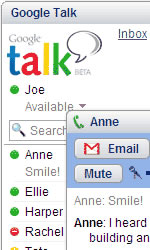 Google Talk
Google Talk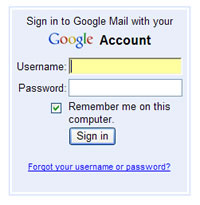 Google Mail
Google Mail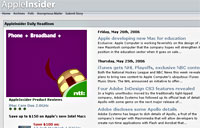 Apple’s attempt to identify the sources of leaked product information that appeared on Mac enthusiast websites has fallen flat on its face after a Californian court ruled that on-line reporters and bloggers are entitled to the same protections as traditional journalists.
Apple’s attempt to identify the sources of leaked product information that appeared on Mac enthusiast websites has fallen flat on its face after a Californian court ruled that on-line reporters and bloggers are entitled to the same protections as traditional journalists. The court was having none of it, with a unanimous ruling giving the three online publications protection under the shield law, as well as the constitutional privilege against disclosure of confidential sources.
The court was having none of it, with a unanimous ruling giving the three online publications protection under the shield law, as well as the constitutional privilege against disclosure of confidential sources.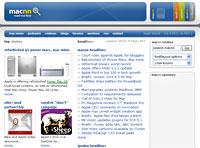 “The shield law is intended to protect the gathering and dissemination of news, and that is what petitioners did here,” added Justice Rushing.
“The shield law is intended to protect the gathering and dissemination of news, and that is what petitioners did here,” added Justice Rushing. In the normal world, if you’d just discovered that your business had lost £14.9bn ($27.9bn) in a single year, you’d be blubbering into your laptop or heading to the pub to down a vat of Old Scrote’s Badger ale.
In the normal world, if you’d just discovered that your business had lost £14.9bn ($27.9bn) in a single year, you’d be blubbering into your laptop or heading to the pub to down a vat of Old Scrote’s Badger ale.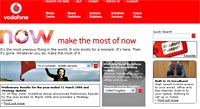 In the white-hot mobile phone segment, Vodafone continues to create growth in key markets such as Germany, Spain and the United States, despite being forced to scuttle out of Japan – selling the business for £8.9bn – after failing to make much of a mark in the country.
In the white-hot mobile phone segment, Vodafone continues to create growth in key markets such as Germany, Spain and the United States, despite being forced to scuttle out of Japan – selling the business for £8.9bn – after failing to make much of a mark in the country. All of those children who have been struggling to get their parents to buy them the playground-must-have, an iPod, now have the ultimate excuse – “But it’s for my edukashon!”
All of those children who have been struggling to get their parents to buy them the playground-must-have, an iPod, now have the ultimate excuse – “But it’s for my edukashon!” Deja Vu
Deja Vu Students will be able to download study guides that work with Pearson’s educational texts and listen to review notes to prepare for exams.
Students will be able to download study guides that work with Pearson’s educational texts and listen to review notes to prepare for exams. Apple has used this approach previously. Many years ago Apple started selling their computers to school children at a discount, with the logic that if they were hooked early, they’d be in the Apple-way for the rest of their lives.
Apple has used this approach previously. Many years ago Apple started selling their computers to school children at a discount, with the logic that if they were hooked early, they’d be in the Apple-way for the rest of their lives. PayPal is to be the exclusive online wallet across Yahoo’s product and services. In a wide-ranging, four component, business arrangement announced today, eBay and Yahoo will be stroking each other commercial departments.
PayPal is to be the exclusive online wallet across Yahoo’s product and services. In a wide-ranging, four component, business arrangement announced today, eBay and Yahoo will be stroking each other commercial departments. Interestingly Yahoo will also be offering sponsored search for complementary products on some eBay.com search results pages in the U.S.
Interestingly Yahoo will also be offering sponsored search for complementary products on some eBay.com search results pages in the U.S. For us, this part of the announcement is a bit of a strange one. Yahoo has Yahoo Messenger with Voice and eBay has Skype, so who would provide the voice services in which circumstances is pretty unclear, and we would have though, an area for friction.
For us, this part of the announcement is a bit of a strange one. Yahoo has Yahoo Messenger with Voice and eBay has Skype, so who would provide the voice services in which circumstances is pretty unclear, and we would have though, an area for friction. At the W3C conference in Edinburgh today, in a move to get the mobile industry (and possibly more) to standardise on a single Web browser, Nokia has released the source code for the mobile Web browser it developed last year.
At the W3C conference in Edinburgh today, in a move to get the mobile industry (and possibly more) to standardise on a single Web browser, Nokia has released the source code for the mobile Web browser it developed last year.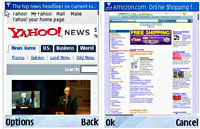 “We want to reduce the fragmentation currently in place in mobile browsing,” said Lee Epting, VP of Forum Nokia, Nokia’s software development support program.
“We want to reduce the fragmentation currently in place in mobile browsing,” said Lee Epting, VP of Forum Nokia, Nokia’s software development support program. Sony Ericsson has announced its first Walkman phone for Japan today and it looks like a beaut.
Sony Ericsson has announced its first Walkman phone for Japan today and it looks like a beaut. True to its Walkman heritage, the slide-out phone has a smorgasbord of built-in dedicated music controls, including a natty new mechanical navigation wotsit bolted on to the bottom of the phone.
True to its Walkman heritage, the slide-out phone has a smorgasbord of built-in dedicated music controls, including a natty new mechanical navigation wotsit bolted on to the bottom of the phone. There’s been no firm announcement of the retail price yet, although it’s hotly rumoured to be around the $180 mark, and no announcement of a UK release yet, natch.
There’s been no firm announcement of the retail price yet, although it’s hotly rumoured to be around the $180 mark, and no announcement of a UK release yet, natch.